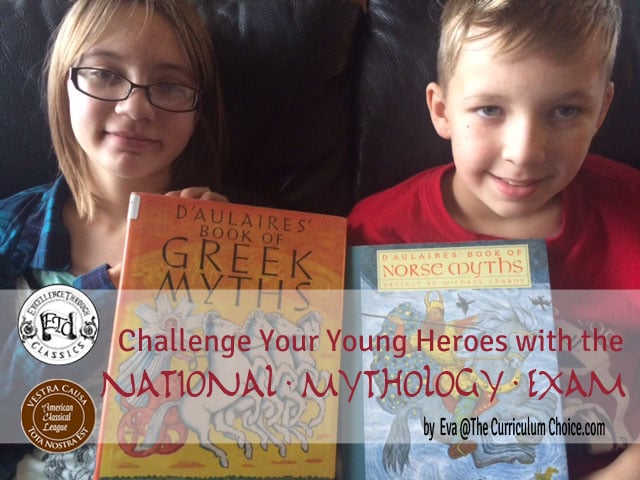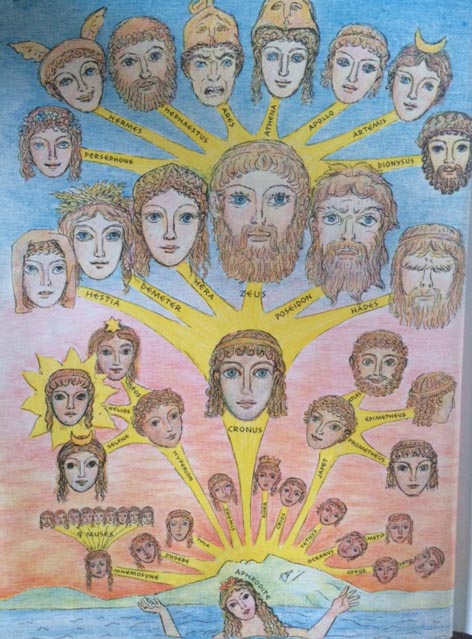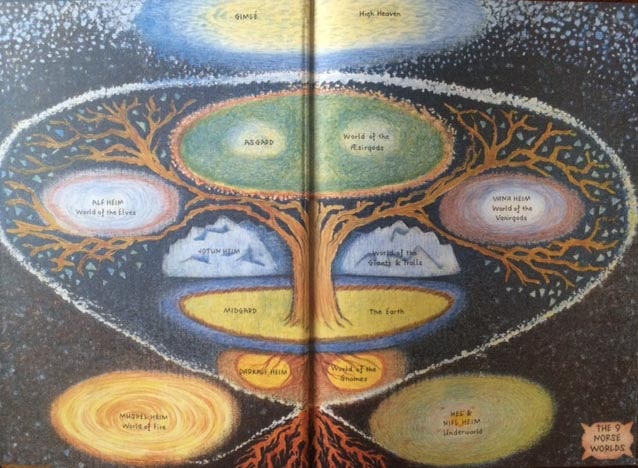For the past few months, my son has lulled himself to sleep by listening to Percy Jackson books on audio. We only own one but he checks the books out on OverDrive (one of our favorite library resources) and will listen to them over and over again. As a result of his recent interest, I knew he would also be interested in the National Mythology Exam that I had planned for my daughter to take in early 2016.
Teaching mythology in middle school is a great way to get students interested in reading, writing, and researching ancient history. I first discovered the National Mythology Exam while guiding my daughter through a unit study on Myths & Legends. She had been fascinated with mythology for a long time (fantasy novels are her favorite genre) and the exam was the perfect challenge for her.
The National Mythology Exam is the most prominent undertaking of Excellence Through Classics, a standing committee of the American Classical League. The league is dedicated to promoting and supporting the study of the classics at the elementary, middle school, and high school levels. Since 1989, the National Mythology Exam has been offered to students in elementary and middle school grades. The exam is consistently given to over 10,000 students in approximately 400 schools around the United States and in several foreign countries.
What does the National Mythology Exam cover?
All grade levels 3-9 MUST take a basic 30-item exam on Greek and Roman mythology (i.e. the core exam). In addition,
- Grades 3-4
- MAY choose to take any other sections
- Grade 5
- MUST also complete 10 questions on the theme (Jason & the Argonauts) and MAY choose to take any other sections
- Grades 6-9
- MUST also complete 10 questions on the theme (Jason & the Argonauts) and at least ONE 10-item literary sub-test of their choice on the following:
- Iliad
- Odyssey
- Aeneid
- Native American tales
- African tales
- Norse Mythology
- MUST also complete 10 questions on the theme (Jason & the Argonauts) and at least ONE 10-item literary sub-test of their choice on the following:
Home-schooled students are welcome to take the NME. Parents are expected to serve as proctors of the exam, following the same procedures lined out for regular classroom teachers.
How does one prepare for the National Mythology Exam?
The core exam is 30 questions and is specific to the first half of D’Aulaires’ Book of Greek Myths (New York, Doubleday and Co., 1962). More advanced students are encouraged to also study H.A. Guerber’s The Myths of Greece and Rome
(New York, Dover Publications, Inc., 1993). Both are available through Amazon (the links provided) or from the American Classical League’s Teaching Materials and Resource Center.
The 10 question subtests are usually drawn from 1-2 stories at most. The ETC website outlines the specific readings and materials from which the exam questions for each of the subtests are derived.
From what I have gleaned on different forums, for kids who love mythology and read a lot of it, the core exam is generally not difficult. The subtests, however, get quite specific and can be difficult. I have also read that sometimes a student who is too familiar with different versions can slip up. It is thereby important to be familiar with the suggested readings. Lastly, the reading level on the subtests is harder than on the core.
I would encourage all students who are interested in mythology to at least take what is required according to their grade level the first year. In subsequent years, adding additional subtests can help keep the interest alive.
The deadline for applying for the National Mythology Exam is Jan. 15, 2016. The period during which the test may be administered is February 22 – March 4, 2016. If you miss the 2016 window, keep it in mind for 2017.
Upon registration you should receive a complete bibliography to use in preparing their students for the exam. Additionally, Excellence Through Classics has activity packets and materials designed to reinforce the concepts and information included in the test available for purchase.




I am very interested in this for my son, but I can’t figure out how to register for the exam! Can you offer any help?
I believe you utilize the Excellence Through Classics link (http://acl-njcl-etc.cloudaccess.host/index.php/etcstore) to order the exam. You’ll need to create a login and password. Each exam is $4 plus there is a $15 shipping fee. They have additional study materials available as well (optional). To confirm, you may wish to contact the Myth Exam Chair, Allison Fiegel (afiegel at wcsks dot com).
Is it possible to avoid the $15 shipping fee? That’s so high, can we download?
Sadly, I don’t believe it is possible to avoid. My only suggestion is to perhaps order tests for other homeschool families you know who also plan to participate and then divide the cost of shipping.
Thanks 🙂
I know this is years later but we registered and I realized the dates for Pegasus are a month earlier than Medusa. I knew we were doing Pegasus but I was looking at Pegasus dates. Would you recommend just daily readings from the two books and doing the sample activities?